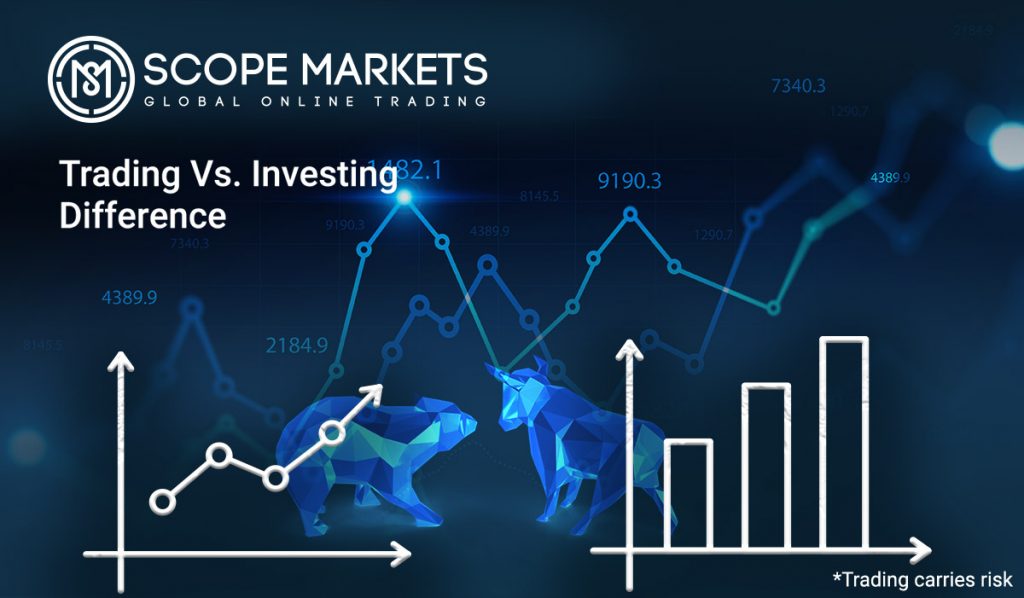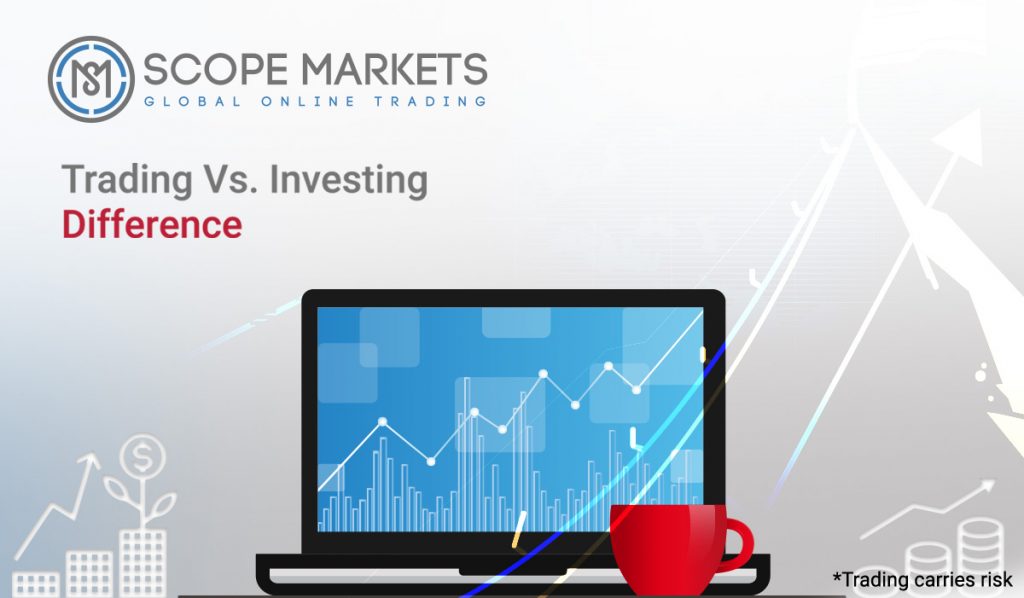Trading Vs. Investing: How to Differentiate Between Two

Contents
Trading Vs. Investing-What is the difference?
The financial markets offer viable income opportunities for both traders and stock investors. But what is the difference between these two?
If you’re a retail investor or want to invest in financial markets, such as stocks markets, commodities or forex markets, you must understand the difference between trading and investing before opening an account.
In this post, we’re going to explain the difference between trading and investing. We’ll help you understand which of these make sense for you.
Trading Vs. Investing: Understand the difference.

What is trading?
Trading is the act of participating in the financial markets to buy or sell securities, commodities, or other tradable goods in the world of Forex. The core principle in trading is to benefit from the short-term price movements in a stock.
Traders rely on technical analysis, market sentiment, and macroeconomic factors to book quick profits. Most traders give little consideration to the fundamentals of a firm, its growth potential, or industry movements. Their only goal is to benefit from price movements in the scrip.
What is investing?
Investing is the act of buying securities or other tradable assets with the intent of earning long-term returns. Unlike trading, investors seek to benefit from long-term growth in share prices.
Stock investors will often look to purchase equities whose market value is lower than their book or intrinsic value in hope that the market will adjust and move towards the book value or higher.
Investors focus on fundamental analysis, growth potential, industry sentiment, and other macroeconomic factors to analyze the stock. Their main source of news about a stock is its quarterly earnings report. They often perform detailed analysis of the data in the earnings report to gauge the financial health of the company and then rate it against other stocks. Most investors aim at opening stock positions at favorable positions (when the scrip price is lower).
Trading Vs. Investing: What are the differences between the two?

Holding period
If you’re a beginner investor trying to differentiate between investing and trading, you can start with the average holding periods in these methods of participating in the financial markets.
The primary intent of a trader is to make a quick profit from security trading. A trader may hold securities for a couple of minutes, days, months, or years.
Based on investing styles and holding periods, we can classify traders into different categories:
- Scalp trader: Scalp traders have the shortest hold period, with no overnight positions. Their holding period can be anywhere between a couple of minutes to hours.
- Day trader: Day traders or intraday traders hold positions for a day, with no overnight holdings.
- Swing trader: Swing traders hold securities for anywhere between a couple of days and weeks.
- Position trader: Position traders have the most extended holding period among traders, lasting from a couple of months to years.
Investing takes a different approach. The primary intent of an investor is to hold a stock for a long duration and earn capital returns on his or her initial investment.
It’s quite common to find investors who hold individual stocks for years and even decades at times.
Also, if you’ve created a goal-based investment portfolio, your holding periods may vary accordingly.
Analysis type
Investing and trading involve different types of analysis techniques.
Trading focuses on technical analysis. The idea is to identify the price projections for a stock in the near future. Technical analysis considers past price movement and its features such as:
- Price trends
- Volume indicators, momentum indicators
- Chart patterns
- Moving averages
- Support and resistance levels.
There is little consideration for the financial standings of a firm while trading.
Investing, on the contrary, involves a fundamental analysis of a stock and the underlying firm. Fundamental analysis is often categorized into quantitative and qualitative analyses. Some of the primary factors that investors look for while evaluating a company are:
- Business model, competitive advantage
- Management, leadership
- Balance sheet, income statement
- Cash flow in any given period
- Intrinsic value of a stock
- Macroeconomic factors and its impact on the firm or broader industry
Investors intend to benefit from the long-term growth of a firm. Paying attention towards these factors help them understand and to some extent, identify the growth potential of a firm.
Risk levels
As a retail investor, you should be ready to bear some amount of risk when investing in the financial markets.
Trading is accompanied by a higher degree of risk. Stock traders take into account external factors when trying to predict price movements. They have to make short-term, quick trading decisions, which could either do well or go wrong.
It is not uncommon for a trader to hit the lower end or the higher end of the price range.
Investing, on the other hand, involves risk, but much lower than trading. Since you use fundamental analysis, along with other macroeconomic factors, you are better positioned to make a buying or selling decision.
Additionally, if you hold stocks for a longer period, your investments will enjoy compounding growth with the help of dividend reinvestments and stock splits.
Ability to time the market
Timing is a critical component in any financial market. However, how traders and investors time the market is different.
In the case of traders, timing is of utmost importance. Since traders tend to capitalize on incorrect pricing or slight movements in stock prices, entering or exiting a trade at the right time could make a massive difference in the profit margins.
When it comes to investing, most seasoned investors try to create positions during low (price) cycles, allowing them to benefit from the positive movements. However, it isn’t the defining factor in their trade. Since they hold securities for a longer-term, they can outgrow any minor mistakes in timing the market.
What you must do before starting your career in stock trading and investing

Now that you understand the difference between trading and investing, it’s time to find out what you must do before starting in any of these fields.
3 Things to consider before starting stock trading
- Create a strategy before making your first trade. It should address your analysis technique, your holding period, and how you intend to generate money (selling gains or shorting a stock).
- Define how much loss you can take in a trade. Ideally, you shouldn’t bet all your money on a single trade. Most advanced traders use less than 5% of their funds on a single trade.
- Consider subscribing to a proven stock advisor’s signal and analyses. Some companies are heavily invested in analyzing stocks and could provide quality advice at a fee to help you grow your portfolio. For instance, as at the time of this writing, Mortley Fool stock advisor year-to-date performance was +503%. Note that past performance doesn’t guarantee future performance.
3 Things to consider before starting stock investing
- Create an investment plan. Mention specific financial goals that you would like to achieve such as “Becoming a dollar millionaire” and choose investments accordingly.
- Create a function for growth to reach your investment plan. This could be in terms of periodic deposits into your portfolio, reinvestments as well as a dividend policy for your periodic profits.
- If you are creating a portfolio, make sure to rebalance it at least once or twice every year. Financial experts recommend investors to diversify their portfolio by adding different types of stocks and assets.
- Be patient during volatile market conditions.
Always remember that participating in the financial markets requires you to have a clear strategy. Make sure to continue educating yourself and learn from every mistake you make in the process.
Article Disclaimer
